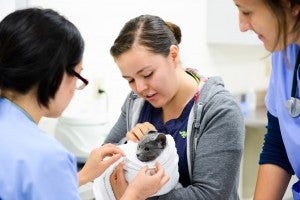“The delicate balance of mentoring someone is not creating them in your own image, but giving them the opportunity to create themselves.” – Steven Spielberg

Companion Exotic Animal Medicine & Surgery Service (CAPES) resident Dr. Miranda Sadar (right), accompanied by student Athena Gianopoulos and staff, prep and neuter a pet rabbit at the veterinary hospital.
At the UC Davis School of Veterinary Medicine, we are in the business of mentoring on a daily basis. An important aspect of our educational mission as we train the next generation of leaders in veterinary medicine and science is creating an environment that fosters best practices in mentoring. Faculty, staff, deans, and students all benefit from being mentored and if each of us thought for a minute, we could likely recall a key mentor in our lives that helped guide us at critical junctions in our careers.
There are various types of mentors. A mentor can serve the purpose to inform a mentee about a field of study or become more involved as a career mentor devoted to the professional development of their mentee. A life mentor often provides guidance beyond professional career growth and may discuss wellness and the balance of work-life with those they advise. Peers can be effective mentors and provide more informal guidance.

Students meet with prospective employers at the 2015 Career and Networking Night organized by the Career and Wellness Center.
To be an effective primary mentor for someone requires a synthesis of all of the advice and information, and the ability to map a pathway for the professional and personal growth of the person who is being mentored. Regardless of the type of mentor-mentee relationship, effective mentoring is the joint responsibility of the academic or program unit, the faculty or clinician advisors, and the person who is the mentee. To this end, we have developed the SVM Career, Leadership and Wellness Center, which offers numerous professional and career development services to support the success of our DVM students.
The characteristics of a good mentor are the ability to provide honest feedback, openness to the mentee relationship, and commitment of time. Exceptional mentors are inspirational and motivate mentees through their advice and guidance. Providing realistic structure and timelines of career achievements are valuable contributions that mentors provide to their mentees. In addition to the commitment of time and advice, a mentor should encourage mentees to build networks and promote ethical standards. The best mentors are role models who “walk-the-walk” and act like someone that the mentee aspires to be like. As faculty, if we are not modeling the behaviors and actions we ask our staff and students to achieve, we are failing in our mentoring responsibilities.
Equally important is the need for mentees to seek out nurturing mentors who have the expertise and patience to be an effective mentor. Mentees should also clearly state their goals and needs to maximize the interactions with their mentors. They need to respect the demands of time and effort on the part of the mentor and clearly follow up when milestones are agreed upon with their mentors. Mentees, whether they are faculty, staff, or students, must take responsibility for their careers and seek a path that matches their passions, as well as their knowledge and skills. Honesty in the relationship also requires self-awareness of their own limitations and when to take a break and take care of their personal wellness and health.
For our school to realize our goals, we must embrace mentorship as a core principal in our community. As mentors, we must also encourage self-growth in those we advise, realizing their unique talents and dreams. We are molding our mentees, but not in our image. Our work will be rewarded when our mentees become fully realized and accomplish their career goals and feel good about their experiences with us during their life’s journey, and smile as they reflect upon their past with us.

